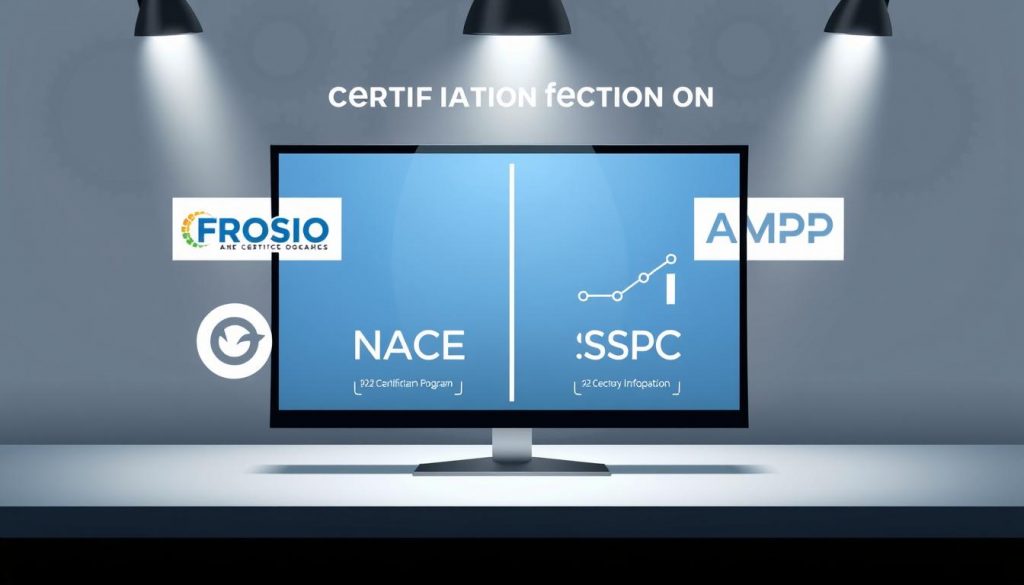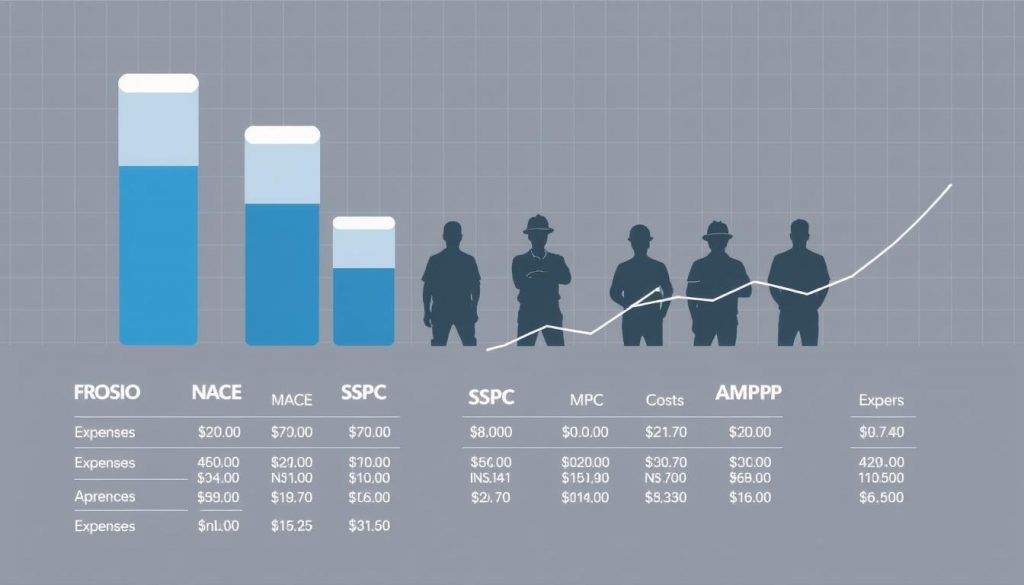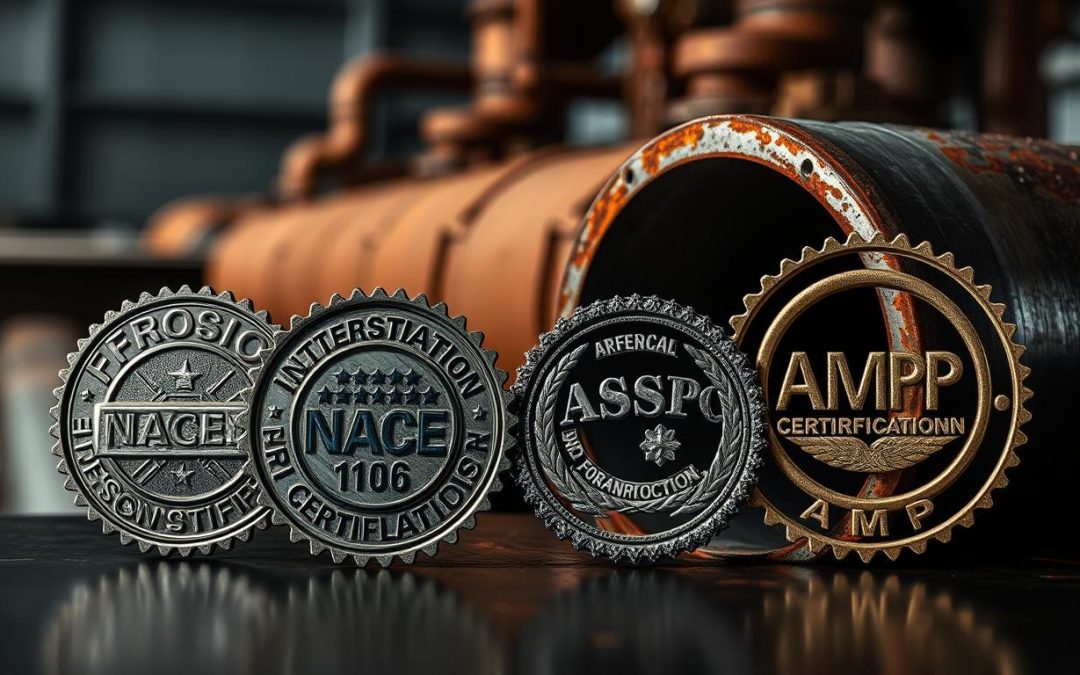Corrosion protection is a critical aspect in various industries as it significantly influences the lifespan and safety of materials and structures.
To ensure the quality and effectiveness of corrosion protection measures, various certifications have been established. These include, among others, FROSIO, NACE, SSPC, and AMPP, each setting specific requirements and standards.
These certifications play an important role in ensuring that professionals and companies apply the best practices in corrosion protection.
Key Takeaways
- Corrosion protection is crucial for the longevity of materials.
- Certifications like FROSIO, NACE, SSPC, and AMPP set the standards.
- These standards ensure the quality of corrosion protection measures.
- Professionals and companies benefit from these certifications.
- They help in applying the best practices in corrosion protection.
The Importance of Corrosion Protection Certifications in Modern Industry
Corrosion protection certifications are indispensable in modern industry as they guarantee the quality and safety of materials and structures. These certifications play a crucial role in preventing corrosion damage, which can lead to expensive repairs, failures, and even safety risks.
Why Certifications in Corrosion Protection are Indispensable
Certifications in corrosion protection are indispensable for several reasons. First, they ensure that the professionals entrusted with corrosion protection measures possess the necessary knowledge and skills. Second, they help establish uniform standards in the industry, which in turn improves the quality of the work performed. Finally, certifications increase transparency and trust between clients and contractors.
Some of the key benefits of corrosion protection certifications include:
- Improved quality of corrosion protection measures
- Increased safety for people and equipment
- Better comparability of offers and services
- Increased efficiency through standardized processes
Overview of the Leading Certification Organizations
There are several leading certification organizations in the field of corrosion protection. Among the best known are FROSIO, NACE, SSPC, and more recently AMPP, which was formed from the merger of NACE and SSPC. Each of these organizations offers various certification programs tailored to the specific needs of the industry.
These organizations play a vital role in setting standards and ensuring that professionals have the required competencies to effectively carry out corrosion protection measures.
FROSIO: The Norwegian Standard with International Recognition
FROSIO, originally from Norway, is now a globally accepted standard in the field of corrosion protection. The organization has made a name for itself through its stringent certification programs for inspectors and plays an important role in the global industry.
History and Development of the FROSIO System
The FROSIO system was developed in Norway to improve quality and safety in corrosion protection. Since its inception, it has continuously evolved and is now internationally recognized.
The history of FROSIO is closely linked to Norwegian industry, particularly the offshore and shipbuilding industries, where corrosion protection plays a critical role.
The Three FROSIO Inspector Levels in Detail
FROSIO offers three certification levels for inspectors: Level I, Level II, and Level III. Each level represents a different degree of expertise and responsibility in the field of corrosion protection.
- Level I: Basic knowledge and skills for the inspection and supervision of corrosion protection measures.
- Level II: Advanced knowledge and the ability to lead and supervise complex corrosion protection projects.
- Level III: The highest level of expertise, enabling the holder to solve complex technical problems and act as an expert.
Requirements and Examination Content for FROSIO Certificates
The requirements for obtaining a FROSIO certificate are strict and include both theoretical and practical exams. The examination content is comprehensive and covers all aspects of corrosion protection.
Exam topics include the fundamentals of corrosion protection, surface preparation, coating materials and methods, as well as inspection and testing methods.
NACE International: Pioneer in American Corrosion Protection
NACE International is a pioneer in American corrosion protection. The organization has a long history and plays a crucial role in the development of standards and certifications in the field of corrosion control.
The Origin Story of NACE
NACE International was founded in 1943 and has since worked continuously to improve knowledge and skills in the field of corrosion protection. The organization is headquartered in Houston, Texas, and is internationally recognized.
Coating Inspector Program (CIP) and Other Certifications
NACE offers various certification programs, including the Coating Inspector Program (CIP), which specializes in the inspection of coatings. Other certifications include the Corrosion Technologist and the Senior Corrosion Technologist. These programs are designed to train professionals to the highest standards.
| Certification | Description |
|---|---|
| Coating Inspector Program (CIP) | Certification for coating inspectors |
| Corrosion Technologist | Certification for corrosion specialists |
| Senior Corrosion Technologist | Certification for experienced corrosion specialists |
Industry Standards and Technical Publications by NACE
NACE publishes numerous industry standards and technical publications that serve as a reference for corrosion protection experts. These publications cover a wide range of topics and provide valuable information for practical application.
SSPC: The Society for Protective Coatings and its Significance
The Society for Protective Coatings (SSPC) is a leading organization in the field of corrosion protection through coatings. Its work focuses on developing standards, certification programs, and guidelines for the industry.
Historical Development of SSPC
SSPC was founded in 1950 and has since become one of the most renowned organizations in the field of corrosion protection. Its establishment was an important step towards standardizing coating techniques and procedures.
SSPC Certification Programs for Inspectors and Contractors
SSPC offers various certification programs tailored to the needs of inspectors and contractors. These programs include, among others:
- Certification for Coating Inspectors
- Certification for Surface Preparation and Coating Application
- Certification for Industrial Painting
These certifications are internationally recognized and help improve the quality of coating work.
SSPC Standards and Their Application in the Industry
SSPC develops and publishes standards for coating materials, surface preparation, and application techniques. These standards are applied in various industries, including:
| Industry | Application |
|---|---|
| Shipbuilding | Coating of ship hulls |
| Infrastructure | Corrosion protection for bridges and buildings |
| Oil and Gas | Coating of pipelines and facilities |
SSPC plays a crucial role in promoting corrosion protection through high-quality coatings. Through its certification programs and standards, it contributes significantly to quality assurance in the industry.
AMPP: The Unification of NACE and SSPC – What Does It Mean for You?
The emergence of AMPP from the merger of NACE and SSPC brings both opportunities and challenges for professionals in corrosion protection. This change not only affects the certification landscape but also the way industry professionals shape their careers and develop their skills.
Reasons and Process of the Merger
The merger of NACE and SSPC to form AMPP was initiated to bundle the resources and expertise of both organizations, creating a stronger, unified voice in the field of corrosion protection. This merger is intended to improve the efficiency and effectiveness of certification processes and provide added value to members and certificate holders.
New Certification Structure under AMPP
A new certification structure is being implemented under AMPP, building on the proven programs of NACE and SSPC while also integrating innovative elements. This structure aims to increase the comparability and recognition of certificates and to facilitate the transition for existing certificate holders.
| Certification Program | Description | Target Audience |
|---|---|---|
| Coating Inspector | Certification for coating inspectors | Inspectors and Contractors |
| Corrosion Specialist | Advanced training for corrosion specialists | Corrosion Specialists |
Transitional Arrangements for Existing NACE and SSPC Certificates
For holders of NACE and SSPC certificates, there are clear transitional arrangements that ensure a smooth transition to the new AMPP certificates. These regulations include deadlines and requirements for converting to the new certificates to ensure the continuity of professional qualifications.
The merger into AMPP represents an important step in the evolution of corrosion protection. By pooling resources and creating a new, unified certification structure, AMPP will take a leading role in the industry.
Comparison of Certifications: FROSIO, NACE, SSPC, and AMPP in Detail
The certification landscape in corrosion protection is shaped by four main players: FROSIO, NACE, SSPC, and AMPP. A detailed comparison of these certification programs is essential for making an informed decision.
Technical Differences in Examination Content
The technical content of the certification exams varies between the organizations. FROSIO focuses on Norwegian standards, while NACE and SSPC emphasize American standards. AMPP, as a merger of NACE and SSPC, combines these approaches.
| Organization | Focus | Examination Content |
|---|---|---|
| FROSIO | Norway | Corrosion protection, surface preparation |
| NACE | USA | Corrosion control, coatings |
| SSPC | USA | Coatings, surface protection |
| AMPP | USA | Combination of NACE and SSPC |
International Recognition and Industry Acceptance
International recognition varies by region and industry. FROSIO is strongly represented in Europe, while NACE and SSPC dominate in North America. AMPP aims for global unification.
“Certification according to international standards is of great importance for companies worldwide.”
Strengths and Weaknesses of the Different Programs
Each program has its strengths and weaknesses. FROSIO is known for its strict Norwegian standards, while NACE and SSPC offer a wide range of certifications. AMPP benefits from the combined resources of its two predecessor organizations.

Industry-Specific Relevance: Which Certification for Which Sector?
The choice of the right certification depends heavily on the specific industry and project requirements. Different industries have different demands for corrosion protection, and the right certification can significantly influence the success of a project.
Oil and Gas Industry
In the oil and gas industry, certifications like NACE and AMPP are of great importance as they cover special requirements for corrosion protection in extreme environments. The NACE certification is particularly relevant for the inspection and protection of pipelines and storage tanks.
Maritime and Offshore Applications
For maritime and offshore applications, the FROSIO certification is particularly recognized as it sets strict requirements for corrosion protection and surface preparation. This certification is crucial for the safety and longevity of ships and offshore platforms.
Infrastructure and Construction
In infrastructure and construction, certifications like SSPC and AMPP are relevant as they set standards for the protection of bridges, buildings, and other structures. These certifications ensure the quality and durability of construction projects.
Energy Sector and Power Plants
In the energy sector and in power plants, corrosion protection is critical for the safety and efficiency of facilities. Certifications like NACE and AMPP provide the necessary standards for inspection and maintenance to prevent failures and extend the life of the assets.
| Industry | Relevant Certification | Requirements |
|---|---|---|
| Oil and Gas Industry | NACE, AMPP | Corrosion protection in extreme environments |
| Maritime and Offshore | FROSIO | Strict requirements for corrosion protection and surface preparation |
| Infrastructure and Construction | SSPC, AMPP | Standards for the protection of structures |
| Energy Sector and Power Plants | NACE, AMPP | Inspection and maintenance for safety and efficiency |
Overall, it is important to choose the right certification based on the specific industry and project requirements to ensure optimal corrosion protection.
Career Advantages through FROSIO, NACE, SSPC, and AMPP Certifications
With a certification in corrosion protection, professionals can achieve their career goals faster. Obtaining such a certification not only demonstrates commitment to one’s profession but also the ability to master complex challenges in the field of corrosion protection.
Salary Prospects with Different Certificates
Holders of FROSIO, NACE, SSPC, and AMPP certifications often benefit from higher salaries. A study shows that certified professionals earn, on average, up to 20% more than their non-certified colleagues.
| Certification | Average Salary |
|---|---|
| FROSIO | €60,000 |
| NACE | €65,000 |
| SSPC | €62,000 |
| AMPP | €70,000 |
Job Opportunities and Career Paths
Certified professionals have access to a wide variety of job opportunities. They can work in various industries such as the oil and gas industry, construction, or shipbuilding. Certification also opens doors to leadership positions.
Testimonials from Certificate Holders
Certificate holders report improved career opportunities and greater recognition in their professional field. “The certification helped me to prove my competence and take on new challenges,” says a FROSIO certificate holder.
Investing in Your Future: Costs and Time Commitment for Certifications
If you are pursuing a certification in corrosion protection, you should be aware of the associated costs and time commitment. The various certification programs such as FROSIO, NACE, SSPC, and AMPP have different requirements that have both financial and time implications.
Direct and Indirect Costs Compared
The costs of certification consist of direct and indirect expenses. Direct costs include exam fees, course materials, and possibly travel expenses for training or exams. Indirect costs can arise from the time commitment for preparation, as this often means time away from the workplace.

Preparation Time and Exam Duration
The time commitment for preparing for a certification exam can vary significantly, depending on the candidate’s prior knowledge and experience. On average, you can plan for several weeks to months of preparation. The actual exam duration varies by certification program but typically ranges from a few hours to a full day.
Recertification Requirements and Continuing Education
An important consideration when investing in a certification is the recertification requirements. Most certification programs require regular recertification to ensure that certificate holders remain up-to-date with the latest technology and industry standards. This can mean additional costs and time commitment, but it is an important aspect of long-term career planning.
Practical Tips for a Successful Certification
The key to a successful certification lies in proper preparation. Good preparation includes both understanding the theoretical content and the ability to apply it in practical applications.
Optimal Preparation for Theoretical Exams
To successfully pass the theoretical exams, you should focus on the relevant topics. This includes studying the official teaching materials and participating in prep courses.
- Study the official textbooks and guidelines.
- Participate in preparatory courses to deepen your knowledge.
- Practice with old exam questions to familiarize yourself with the format.
Strategies for Practical Exam Parts
For the practical parts of the exam, it is important that you have hands-on experience. Participate in practical exercises and work with experienced professionals.
| Strategy | Description |
|---|---|
| Practical Exercises | Participate in practical exercises to improve your skills. |
| Collaboration | Work with experienced professionals to benefit from their experience. |
Common Mistakes and How to Avoid Them
Some of the most common mistakes in certification exams are lack of preparation on specific topic areas and inadequate time management. To avoid these mistakes, you should create a detailed study plan and focus on your weak areas.
Preparing for a certification is like training for a marathon – it requires discipline and perseverance.
By following these practical tips, you can significantly increase your chances of a successful certification.
The Future of Corrosion Protection Certifications after the AMPP Merger
The AMPP merger marks a turning point in the history of corrosion protection certifications. The unification of NACE and SSPC creates new opportunities and challenges for professionals in the field of corrosion protection.
Expected Developments and New Standards
After the merger, a harmonization of certification processes and standards can be expected. This could lead to a simplification of certification procedures and improve international comparability. New standards will likely be developed to meet the current challenges in corrosion protection.
Uniform examination content and modern training methods are other expected developments. These are intended to ensure that certificate holders are up-to-date with the latest technology and meet the demands of the industry.
Digitalization and Technological Innovations in the Examination System
The AMPP merger also offers the opportunity to introduce digital technologies and innovative examination methods. Online training and virtual exams could play a larger role in the future to increase the accessibility and flexibility of certification processes.
Furthermore, modern analysis tools and simulation-based exams could be used to better assess the competence of the candidates. These innovations help to increase the quality and relevance of corrosion protection certifications.
Conclusion: The Right Certification Strategy for Your Professional Success
Choosing the right certification strategy is crucial for your professional success in the field of corrosion protection. By analyzing the various certification programs like FROSIO, NACE, SSPC, and AMPP, you can choose the best option for your career.
An effective certification strategy should be tailored to your individual needs and career goals. Consider the industry-specific requirements and the international recognition of the certification.
By choosing the right certification strategy, you can demonstrate your competence in corrosion protection and improve your career opportunities. Invest in your future and benefit from the advantages of professional certification.

